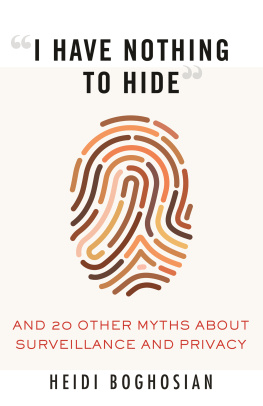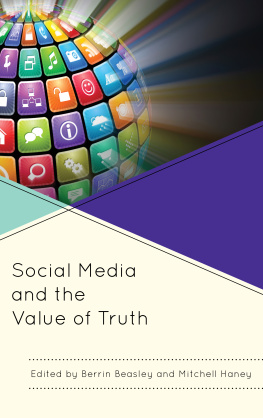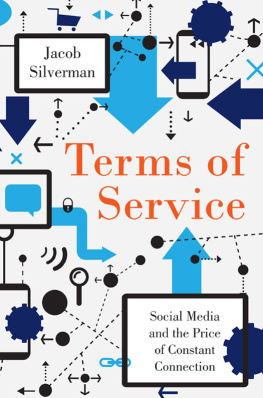
Contents

Guide
Introduction

Instant messages between Mark Zuckerberg and a friend after Facebook launched:
Zuck: Yeah so if you ever need info about anyone at Harvard
Zuck: Just ask.
Zuck: I have over 4,000 emails, pictures, addresses, SNS
[Redacted friends name]: What? Howd you manage that one?
Zuck: People just submitted it.
Zuck: I dont know why.
Zuck: They trust me
Zuck: Dumb fucks.
A quarter-century after the advent of the World Wide Web, communication has become synonymous with surveillance. The only unrecorded speech is the chatter of two friends spending a moment together, and one day soon that will change. Sensors and cameras proliferate through our homes and cities like spores, appearing in eyeglasses, phones, cameras, streetlights, cars, game systems, shoes, jewelry, and wherever else a signal may be found. Eventually, if the technology industrys most fervent boosters are to be believed, our whole world, and all of our sensations and thoughts within it, will be transcribed. Not because it is right or good, but because we can, and because this information, they promise, will be useful. In this temple, anything is worth sacrificing on the altars of efficiency and productivity.
In recent years, surveillance has become an inextricable part of our culture, from tech companies lofty pronouncements that, by observing their users so closely, they can understand them and anticipate their needs; to the hundreds of millions of us engaging in mutual surveillance, crafting permanent online identities that allow us to see and be seen. This is the culture of social media, which has become a catchall term, describing more than just Facebook, Twitter, and the other big social networks in which millions of people broadcast to one another simultaneously and trade in the currency of attention. Social media now refers to a set of technical features and social practicesreal names, sharing widgets, fixed identities and profiles, behavioral tracking, data mining, the spreading of media and personalities through viral channels, a process of relentless personalizationthat have come to define the Web and our place in digital culture. The Internet is being thoroughly socialized, which is to say thoroughly monitored, whether by another human being or one of the ubiquitous tracking systems that supplies data to social networks, advertisers, and market researchers. Social media is the number one activity on the Web. Theres nothing we spend more time doing online. One poll found that most British babies appear on social media within an hour of being born. Many human beings acquire a data trail almost as soon as they appear in the worldand sometimes before. Once created, it can never be destroyed, only modified, added to, parts of it made more visible while others are suppressed. To become part of the social web, then, is to join the networks of surveillance, tracking, and data circulation that now support a vast informational economy and increasingly shape our social and cultural lives.
Few aspects of contemporary life have gone unaffected by this shift, by the ability to publish immediately, freely, and to a massive audience. Shareability, and the drive to rack up likes and other metrics, guides the agendas of magazine editors and the budgets of marketers. Sentiment analysisthe mining of social-network data to determine the attitudes of individuals or whole populationshelps intelligence analysts learn where potential extremists are becoming radicalized. Advertisers collect social-media data and form consumer profiles with tens of thousands of pieces of information. Large corporations use social media to befriend customers, offer personalized customer service, and churn out friendly propaganda. Reporters publish breaking information on Twitter before they do in their own papers. Far-flung friends and families stay in touch, share news, fall in love, argue about politics, and ponder the trivial items of the dayall in what is essentially public view. Indeed, we are all public figures now, though few of us reap the benefits. We write and take more photographs than ever before, with these actions becoming less about capturing events than sharing them. The fullness of our lives is confirmed by our place in these networks and by the size of our audiences. I share, therefore I ammore interesting, more sociable, more desirable, more myself.
Social media is also part of a utopian vision that a number of major tech executives share. It is the means by which we will create better, more equitable societies, where problems will be solved by the harnessing of ever more personal data. Todays big technology firms stand ready to lead us there. As Eric Schmidt, Googles executive chairman, describes it: Its a future where you dont forget anything... In this new future youre never lost... We will know your position down to the foot and down to the inch over time... Your car will drive itself, its a bug that cars were invented before computers... youre never lonely... youre never bored... youre never out of ideas.
Cell phone sensors, search tools, GPS, and the like will provide some of the data that will inform this future. But social media will lead the vanguard, trailed by the personal information, thoughts, feelings, reflections, and raw data that users provide, whether we like it or not. It will be made up of the informationalized versions of ourselves, as every aspect of human affairs becomes digitized, tracked, circulated, mined for patterns. The paradigm of social media is one that Silicon Valley would like to extend to society at large: a technocracy of benevolent, but total, surveillance. In this kind of society, profits flow to platform owners, not those writing tweets and sharing YouTube videos.
T his is a book about the technological moment and the one to comeabout surveillance and celebrity; reputation and influence; the identity-confirming pleasures of visibility and the loneliness of overexposure; and the way we view our world through the Facebook Eye, looking for shareable moments and performing a kind of informational triage, apportioning our lives through digital networks. Its also a response to cyber-libertarianism, the reigning industry philosophy, which holds that large corporations, freed from the shackles of government regulation, claim to know whats best for us and that digital life is inherently emancipatory. (Mostly, were only surrendering ourselves, in the form of data and personal autonomy, to oligarchic platform owners, who sell us to advertisers, data brokers, and intelligence agencies.)
Popular tech writing tends to fluctuate between the two poles of Luddite rejection and unvarnished techno-utopianism. The former is generally considered far less respectable and easily stigmatized. As Richard Byrne wrote in The Baffler, In the straitened and highly ritualized discourse of tech boosterism, Luddite has become a catchall dirty word for anything that stands in its way. Byrnes smart essay about the history of Luddism offered a necessary revisionist take, showing how it really began as a labor movement concerned with workers rights and how automation would deprive skilled workers of their livelihoods. In other words, its a surprisingly contemporary, flexible belief system, not the rigid extremism of the Unabomber.
Next page









